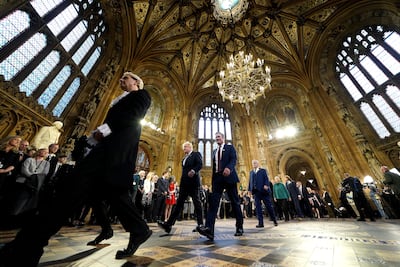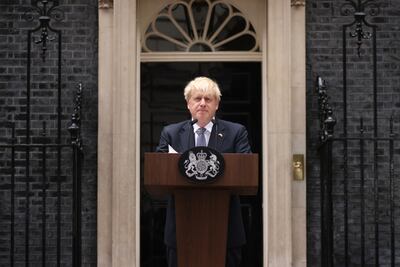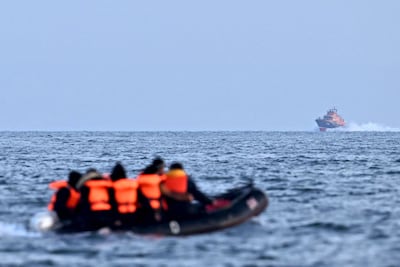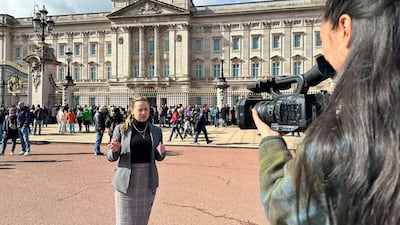When The National’s London bureau looks forward to covering the next big emerging story, the first consideration is to look to what matters to our audience.
How we can generate articles, videos and digital insight that resonate deeply and increase the impact of our work will always be the priority.
The story of The National in London can be traced to the title’s relaunch in 2017. It is one of taking a small start-up operation and focusing on growth. Not only growth in the numbers of journalists but in the work we do and in lifting the profile of our operation.
There are now more than 20 journalists in the bureau newsroom. The operation has strength and depth in the British capital as well as an important presence at the heart of the EU in Brussels.
There are specialist political journalists based in the Lobby in Westminster, senior correspondents who pursue investigations and are focused long-read journalism, and general reporters in the newsroom who master the most relevant stories of the day and breaking news.

There is a community feel to what we do with Lemma Shehadi, a writer who focuses on issues with a Middle East interest, one of our newest team members. Video journalists play a big part in our daily coverage and set out why big issues we’re covering matter to an international audience.
Social media journalists help to shape the coverage and story mix from first thing in the morning and provide valuable insights into how to project relevant and useful news.
The look of The National UK edition is powered by our homepage specialists, who shape a product across the day that will appeal to the UK-based audience as well as those seeking out how we cover the British and European agenda.
Columns provide an opportunity to put a strategic framework around our coverage and give an extra insight from experienced writers who have worked across the UK media.
The bureau chief’s role is to ensure these parts are all working, in their disparate ways, to be interesting and relevant. Above all the job is to expand the following for our brand of international journalism on a crowded political, business, social and media scene.
It means when Thomas Harding and Laura O’Callaghan are working in the Lobby – rubbing elbows with the Prime Minister in a hurried corridor walk – they are engaged with the raw material of British politics. The MPs, ambitious special advisers, officials holding huddled briefings and lobbyists who are bringing new opinions into the UK political system.

When The National ran an interview with Boris Johnson it seemed the UK leader was building a leadership agenda that would stretch far into the future.
His confidence allowed us to tease out his global vision and we asked him to look to how the Middle East offered a building block for his Global Britain agenda.
A few years later it was fascinating for me to be seated in the Oxford parlour of Simon MacDonald, the recently exited head of the Foreign Office, who told how he brought down the teetering prime minister by telling the basic truths that undermined Downing Street’s version of events in the Chris Pincher affair. The 20 hours a day, seven days a week that the bureau works to provide international-facing news is rarely anything but unrelenting.
Deputy bureau chief Paul Carey plays a key role in keeping the team focused on the most important news and stories with the best potential to drive our work. Reporters have a mandate to be at a Foreign Office or, as was the case with Tim Stickings recently, in Belfast ahead of US President Joe Biden’s visit.
The fast start at 7am is one thing but so too is the role played by The National’s London staffers at 1am, often Soraya Ebrahimi, when the breaking news can be a flare-up in Israel or a devastating earthquake in Turkey.
When bureau was five strong on launch in 2017, it was this seven-day-a-week role that stretched our team and proved our commitment not only to take a high profile for UK news but to provide worldwide digital journalism coverage integral to what was to become thenationalnews.com.
Our role in ensuring the website is operating whatever the hour is a very precious part of what we do.
Journalism is about bringing fresh eyes to the people who not only make the news but possess a relevance that ought to be exposed so that readers can share and learn.
It is for that reason that we invest in Arab Showcase, the premier news interview-feature series that has developed a distinctive approach to uncovering who the high-flying subject is and how they’ve been shaped by their background. Assembled by commissioning editor Jac Fuller, the series seeks to give prominence to people of achievement and their battles to preserve the integrity of what they do no matter what the circumstances.

Our footprint has expanded steadily but the near doubling of our team just as the Covid-19 pandemic hit Europe was a challenge all of its own. One day in February 2020, I was returning from the high-profile Munich Security Conference, the next it was all about how to bring on board new recruits while simultaneously scattering the entire team to work from home.
New staffers had to be equipped and explained to how to use the equipment and systems for remote sessions. A whole new structure of how our journalists clustered into teams or synced together remotely had to be drawn up. New personalities take time to uncover and meld into the overall office dynamic. Our then-new office manager played a Stakhanovite role in keeping morale and basic operations functioning in the face of myriad challenges.
From there, the pace of our journalism ignited and never relented. Three prime ministers in 2020, accompanied by foreign secretaries and chancellors and a host of questions about how Britain had lost its way. Even now as the ship steadies under Rishi Sunak the outlook has moved on and we are dealing with how power in the UK has shifted.
There are the big important stories we do that I never lose sight of, or at least try my best not to. Recently, back in Munich, someone mentioned to me in conversation the 2020 confrontation between Greece and Turkey over migrants coming across the land border. I was proud to be reminded that our correspondent had covered the plight of those people on the ground. That was another trip in the teeth of the encroaching pandemic.

From the Greek islands to the bitter English Channel at Dover, The National is there to cover the migrant story as it shapes history within and beyond Europe.
Our team is also there as the Ukraine war enters a new phase and its human or military fallout is felt not only by Kyiv’s neighbours but across the globe.
The pandemic illustrated how health shapes our world. It is my priority that the London bureau leads on how that matters not only to those with a stake in UK health but also leveraging the trailblazing research and treatments emerging in this part of the world.
There are the strategic investment partnerships between the UK and the UAE as well as the wider Gulf economic relationship for us to play our role in reporting on and developing new insights. Recently Matthew Davies talked to Dominic Johnson, a minister who acts as UK custodian of that relationship, about how the next phase will be shaped.
When Grant Shapps, another of our interviewees, plays a leading role in taking the UK to Cop28 in November, we know that we will be there and close to how the net-zero agenda is being shaped.
The great joy in the UK bureau is to unlock some of the most vibrant developments across Europe. Take for example the expansion and investment in areas as diverse as space launches and film studios. We are happy to take our readers inside those hangars where the breakthroughs are being assembled and rolled out.
I even went weightless and undertook a space training session to find out what’s it like to leave the bounds of the Earth. All of us in the bureau share the ethos that our work should stretch beyond the immediate horizon and discover new frontiers.


